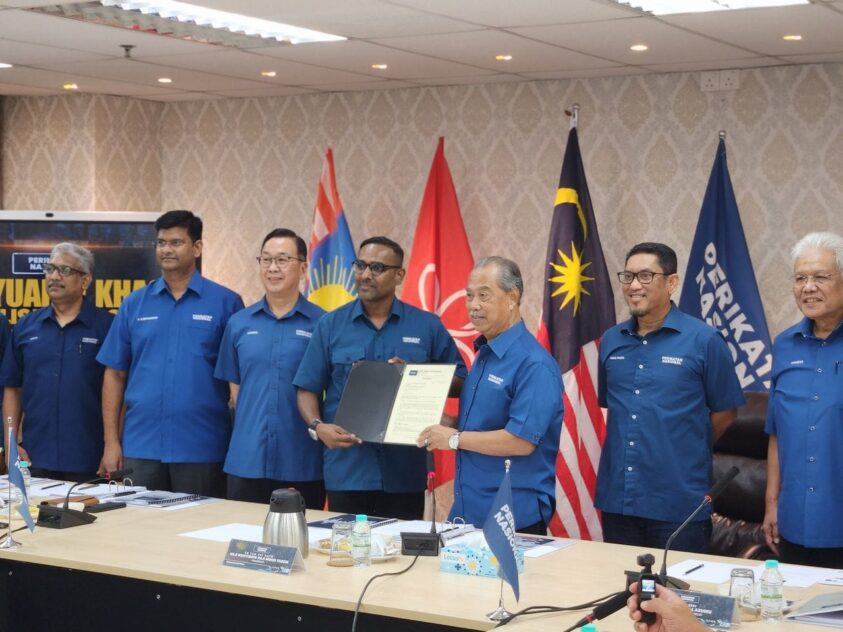
By P Gunasegaram
DESPITE the overall good efforts by the government and in particular, the Health Department, in terms of controlling the spread of Covid-19 there are three concerns at least which need to be addressed by this government to the satisfaction of the public.
One, there are excessive detentions following the movement control order or MCO which has raised legitimate concerns over police highhandedness, extreme sentencing, and the possibility of actually exacerbating Covid-19 instead of controlling it.
Two, the limited 1-day sitting of Parliament, in name only, on May 18 does not allow Parliamentary sanction, legitimacy and debate of the moves taken by the new backdoor government.
And three, this shortened parliamentary session raises issues over the lack of legitimacy of moves taken and the inability to raise more funds to deal with the economic effects of the pandemic.
Over 21,000 people have been arrested for violating the MCO. Many of them have been handed down jail sentences and many were handcuffed and put in police lock-ups before being hauled to court. These are not only continuing, the government is escalating them by setting up 13 additional centres for the detention of people violating the MCO as announced by senior minister Datuk Ismail Sabri.
For what purpose is the government raising the number of detentions? Is it expecting people to continue to defy the MCO – all indications are that they are not – or is it a demonstration of the capability of the government to show it can detain thousands? And for what purpose? Is this thinly veiled intimidation of the public?
The police are too harsh on the people, many of whom have never faced an MCO in their entire lives. The last time that such widespread control was imposed was probably during the May 13, 1969 riots when curfews were declared but mostly in Kuala Lumpur where the riots mainly took place.
While the police and the courts are very hard on violators, detaining them overnight in lock-ups and sometimes handing down heavy sentences on very poor and deprived people, the well-connected get away with it with barely a rap on the knuckles.
Take for instance the case of the two Umno politicians who had dinner with students at a tahfiz school. Ismail defended their RM1,000 fine by saying that they did not violate the MCO but standard operating procedures.
This does not tally with the facts – the two had dinner at the tahfiz school which is not allowed. They were negligent, much more so than some people who were merely outside their house with no chance of infecting anyone. People who attended funerals were arrested and charged in court. Definitely differential treatment here.
Much better is to arrest those who don’t heed the advice but release them on bail immediately. Instead of putting them in prison, make them do community services. All of this will make it needless to put them in contact with others and help prevent the spread of Covid-19.
The 1-day sitting of Parliament is a farce and total abuse of Parliamentary procedure. The only reason it is being held is because it has to be under the law. But the intent of the law is being subverted by holding it for a day during which time nothing substantive will be moved or debated. Parliament will not discuss the issues it must discuss and therefore it is an outright mockery of the law.
The reason for this, as the whole of Malaysia knows but the current government does not admit, is that it may be ousted by a vote of no confidence. While it badly needs more funds to directly inject into the system (instead of reliefs which are the brunt of the economic package), it has to go to Parliament for this.
Instead of working with the opposition to agree to a good stimulus package, it is now constrained because gutter politics dictates that it cannot go to Parliament to get more funds to give direct aid to those most badly affected.
While the so-called Prihatin package is billed as worth RM260 bil, only RM35 bil is direct injection of funds by the government, of which only RM10 bil represents cash handouts to the poor, too minuscule an amount as I have explained here. An amount of RM50 bil is more like it. But that would require parliamentary sanction to get funds.
This reluctance to convene Parliament is going to cost the country dearly because more funds cannot be approved to help the most needy sectors in the country – such is the situation where political power is put above the welfare of most people in the country. This Malay unity government, for all their bluster about Malay rights, is not helping Malays, who form most of the poor in Malaysia, when it is most required!
Covid-19 can’t be used as an excuse to stop Parliament. Many countries, including Singapore, have already passed and implemented Covid-19 legislation. It is a simple matter for us to do the same but politics prevents it.
The shortened Parliament session where nothing of any substance whatsoever will be discussed raises the question of lack of legitimacy over measures taken by the government in terms of the MCO and administrative rules various ministers have been issuing through the Gazette.
In the process, they have stretched the law, possibly to breaking point. For instance, bankruptcy conditions have been amended by blanket exemption orders in the Companies Act from the relevant minister.
It is appropriate to quote the Bar Council here, whose president Salim Bashir said yesterday: “As we in Malaysia begin to plan for an exit strategy from the MCO, urgent legislation is needed now to protect individuals, businesses and companies from the consequences of being unable to perform or fulfil their contractual obligations arising from the measures taken in relation to Covid-19 prevention.
“So far, the measures that have been announced by the Government in relation to commercial activity — apart from ordering businesses and shops to shut or open — lack legitimacy as they are being implemented by way of administrative directives.
“These administrative directives tend to apply only to regulated institutions such as financial institutions, government-linked corporations, government departments and government agencies.
“These do not include the vast number and varied nature of private business transactions, for example supply agreements, sale and purchase agreements, the majority of employment contracts, and rental or hire agreements.”
So far, this government has not demonstrated the statesmanship required to navigate through the troubled waters of Covid-19. It shows up especially in the economic sphere where we may have more trouble further down the line than with the actual control of the disease itself. – April 30, 2020
P Gunasegaram is editor of Focus Malaysia










